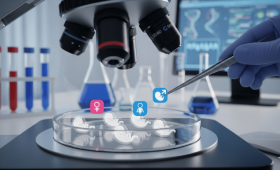What is Sperm Donation?
Sperm donation is a process where a man (donor) provides his sperm to individuals or couples (recipients) who are unable to conceive on their own. This is typically used for fertility treatments, where the sperm is used to fertilize the recipient’s egg in a laboratory setting through assisted reproductive techniques.
Who Can Donate Sperm?
There are specific criteria for sperm donation. Donors undergo a comprehensive evaluation process to ensure the provision of reliable and healthy sperm. General criteria include:
- Age: Typically between 18 and 40 years old.
- Health Status: Passing tests for serious genetic diseases, sexually transmitted diseases, and other infectious diseases.
- Sperm Quality: The sperm must be of a suitable quality for fertilization. This includes factors such as sperm count, motility, and morphology.
- Psychological Evaluation: Some clinics offer counseling to assess whether the donor is psychologically ready for the process and can cope with potential legal or emotional situations in the future.
How is Sperm Donation Done?
The sperm donation process consists of several steps:
- Application and Screening: Potential donors fill out an application form and undergo preliminary health screenings.
- Sperm Collection and Testing: Sperm samples are collected from accepted donors. These samples are analyzed in a laboratory for quality and genetic testing.
- Quarantine and Freezing: The sperm is frozen and placed in quarantine. During this period, the donor’s blood is re-tested. This is important for detecting any potential diseases that were not noticed during the initial donation.
- Availability for Recipients: Once the donor’s sperm is deemed safe, it becomes available for use by recipients.
Donor Candidate Evaluation
To become a sperm donor, potential candidates undergo a comprehensive evaluation, both physically and psychologically. This process includes the following steps:
- Age and General Health Status: Most sperm banks require donors to be within a specific age range (usually between 18 and 39). Candidates undergo a detailed physical examination to determine their general health status.
- Medical and Family History: The candidate’s own medical history, as well as a detailed medical history of their family for at least two generations back, is examined for hereditary diseases or genetic disorders.
- Genetic and Infectious Disease Screening: They are tested for carrier status of genetic diseases such as cystic fibrosis and thalassemia. At the same time, blood and urine tests are conducted for sexually transmitted diseases like HIV, Hepatitis B, Hepatitis C, syphilis, and chlamydia. These tests are repeated at certain intervals if the donor is deemed suitable.
- Sperm Analysis: The quality of the sperm (count, motility, and morphology) is evaluated.
- Psychological Evaluation: The candidate is evaluated by a mental health professional to ensure they understand the emotional and psychological aspects of the donation process.
- Legal Agreements: The donor is informed about the confidentiality and legal responsibilities of the donation process and signs a legal contract.
Storage and Selection at the Sperm Bank
Sperm samples obtained from the donor who successfully completes the evaluation process are processed, frozen, and stored. Recipient couples or individuals can choose a donor through a sperm bank. This selection is usually based on information about the donor’s physical characteristics (hair and eye color, height, weight), education level, profession, and hobbies. The donor’s identity information is kept confidential from the recipient.
Treatment Process
The IVF treatment with sperm donation proceeds similarly to a standard IVF process.
- Preparation: On the 2nd or 3rd day of the recipient’s menstrual cycle, medication is started to stimulate the ovaries. This process lasts approximately 10-12 days.
- Egg Retrieval (OPU): When the eggs reach a certain maturity, the egg retrieval procedure is performed under anesthesia.
- Fertilization and Embryo Development: The collected eggs are fertilized with the chosen donor’s sperm in a laboratory setting using the microinjection (ICSI) method. The fertilized embryos are kept in an incubator for a few days to develop.
- Embryo Transfer: The highest quality embryos that have completed their development are transferred into the recipient’s uterus.
- Pregnancy Test: Approximately 9-12 days after the transfer, a blood pregnancy (Beta hCG) test is performed to determine the result.
Legal Status of Sperm Donation in Turkey and Cyprus
According to the laws of the Republic of Turkey, assisted reproductive techniques that involve obtaining gametes (reproductive cells) from a third party, such as sperm donation, egg donation, and surrogacy, are not legal and are prohibited. The relevant regulation of the Ministry of Health only permits IVF and other fertility treatments to be performed using the married couple’s own reproductive cells (sperm and eggs). The main purpose of this prohibition is stated as protecting the lineage and ensuring the integrity of the family. Therefore, no IVF center or hospital in Turkey can offer sperm donation services, and importing sperm from abroad for this purpose is also illegal.
Legal Status and Practices in Cyprus
In contrast to the legal situation in Turkey, sperm donation can be performed legally in Cyprus. IVF centers in Cyprus can offer this treatment using sperm imported from internationally licensed sperm banks. The treatment process typically begins with selecting a donor sperm that matches the characteristics of the recipient couple.
Privacy and Ethical Considerations
In countries where sperm donation is legal, privacy and ethical considerations are protected by strict rules. In legal systems where this is permitted, there are generally two types of donor profiles:
- Anonymous Donors: The donor’s identity information is kept completely confidential from the recipient couple and the child born. Couples and children can only access general information such as the donor’s physical characteristics, ethnic origin, and medical history.
- Non-Anonymous (Identity-Disclosed) Donors: The donor’s identity is initially kept confidential, but the child has the right to access the donor’s identity information upon reaching adulthood (usually at age 18).

What are the legal rights and responsibilities of donors?
Legal Rights and Responsibilities of Sperm Donors
Sperm donation is a sensitive topic that varies according to the laws of each country. In light of the legal situation in Turkey and generally accepted international practices, the rights and responsibilities of sperm donors can be summarized as follows:
Legal Status in Turkey
Sperm donation is legally prohibited in Turkey. As of 2025, according to the laws and regulations in force, assisted reproductive treatments using third-party (donor) eggs, sperm, or embryos cannot be performed in Turkey. These treatments can only be carried out with the reproductive cells of married heterosexual couples themselves.
Despite this prohibition, sperm donation treatments performed abroad are also considered a crime in Turkey and may be met with penalties such as imprisonment. Therefore, there is no legal basis for being a sperm donor or having a child through this method in Turkey.General International Practices
Although sperm donation is legal in some countries outside of Turkey, the rights and responsibilities of the donor are generally subject to strict rules. These rules aim to protect both the donor and the child born through the donation.
Responsibilities
- Medical Screening and Tests: Donor candidates undergo comprehensive medical and genetic screening to prevent the transmission of genetic and infectious diseases (HIV, hepatitis B/C, syphilis, etc.). They are required to provide a complete and truthful account of their medical history and family disease history.
- Confidentiality and Identity Information: In most countries, the donor’s identity is kept confidential. However, in some jurisdictions, children born through donation may have the right to access the donor’s identity and contact information after they reach the age of 16 or 18.
- Limited Number of Donations: To reduce the risk of consanguineous marriage, most countries have placed limits on how many children a donor can have through donation.
Rights
- Waiver of Parental Rights: Sperm donors have no legal parental rights or responsibilities over the children born from the sperm they donate. This prevents the child from making demands on the donor for matters such as alimony, inheritance, or custody. The donor is not legally recognized as a father to the child they donated.
- Anonymity: If legal regulations allow for anonymity, the donor’s right to have their identity information not be disclosed to the recipient or the child is protected. However, as mentioned above, this anonymity may be limited.
In summary, since such practices are not legal in Turkey, there can be no mention of a donor. However, in an international context, while sperm donors cannot claim a legal right over the child, they also do not bear any responsibility. This legal framework has been established to resolve the complex situations brought about by modern reproductive technologies.
Legal Status in Cyprus
In Cyprus, both in the Turkish Republic of Northern Cyprus (TRNC) and the Greek Cypriot Administration of Southern Cyprus sperm donation is allowed under legal regulations. This situation leads many couples from Turkey to prefer Cyprus for these treatments.
Situation in the TRNC
In the TRNC, sperm donation can be performed within the framework of regulations determined by the Ministry of Health. Here, the rights and responsibilities of the donor are generally in line with international standards:
- Responsibilities: Donor candidates undergo comprehensive medical and genetic screening. Medical history and family diseases must be truthfully declared.
- Rights: The donor has no legal parental rights or responsibilities over the child born from the donated sperm. This prevents the child from making demands on the donor for matters such as alimony, inheritance, or custody. The donor is not legally recognized as a father to the donated child. In addition, the donor’s identity is kept confidential.
Situation in the Greek Cypriot Administration of Southern Cyprus
Similarly, in Southern Cyprus, sperm donation is legal and subject to strict rules. European Union standards and local laws aim to protect the rights of both the donor and the child. The basic rights and responsibilities largely overlap with the regulations in the TRNC.
In short, while such practices are not legal in Turkey, legal regulations exist in Cyprus and some other countries. These regulations ensure that while sperm donors cannot claim a legal right over the child, they also do not bear any responsibility. This legal framework has been established to resolve the complex situations brought about by modern reproductive technologies.



